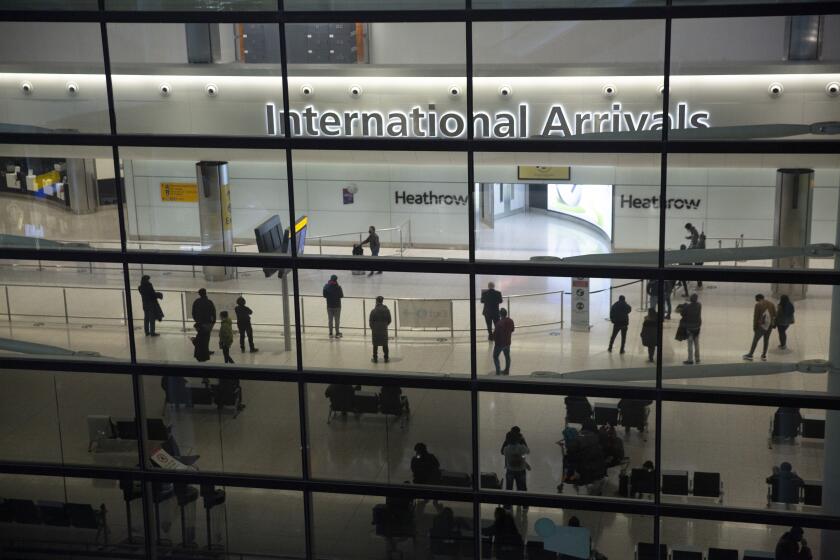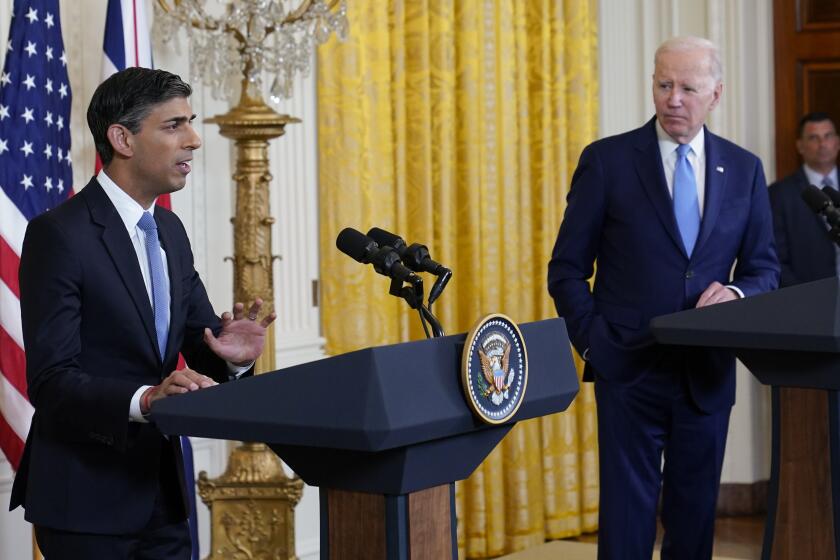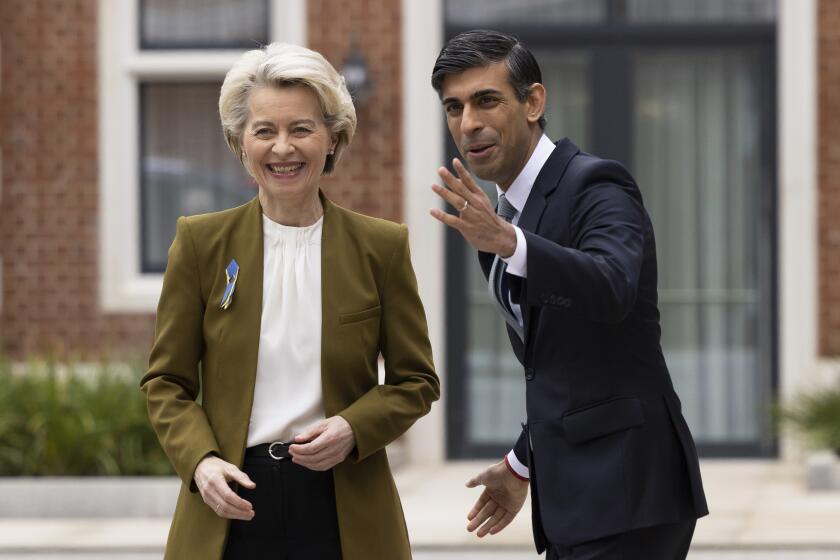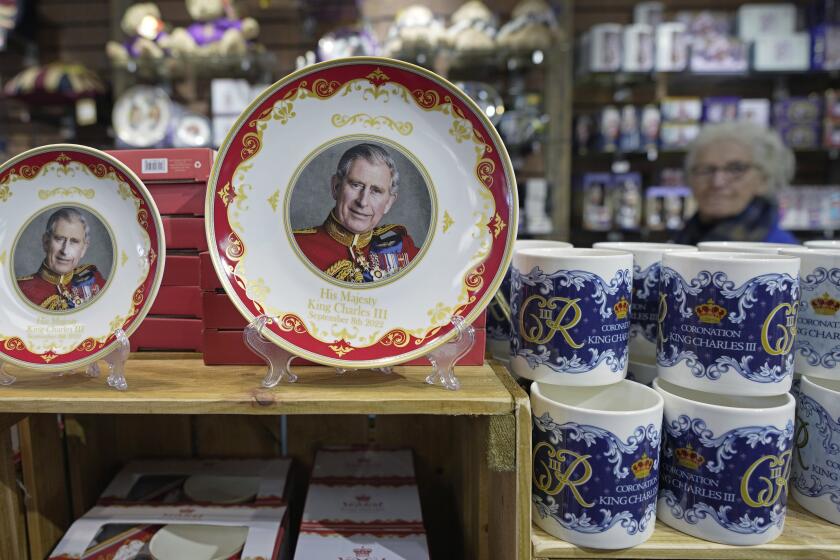Britain’s ruling Conservatives suffer huge routs in two special elections
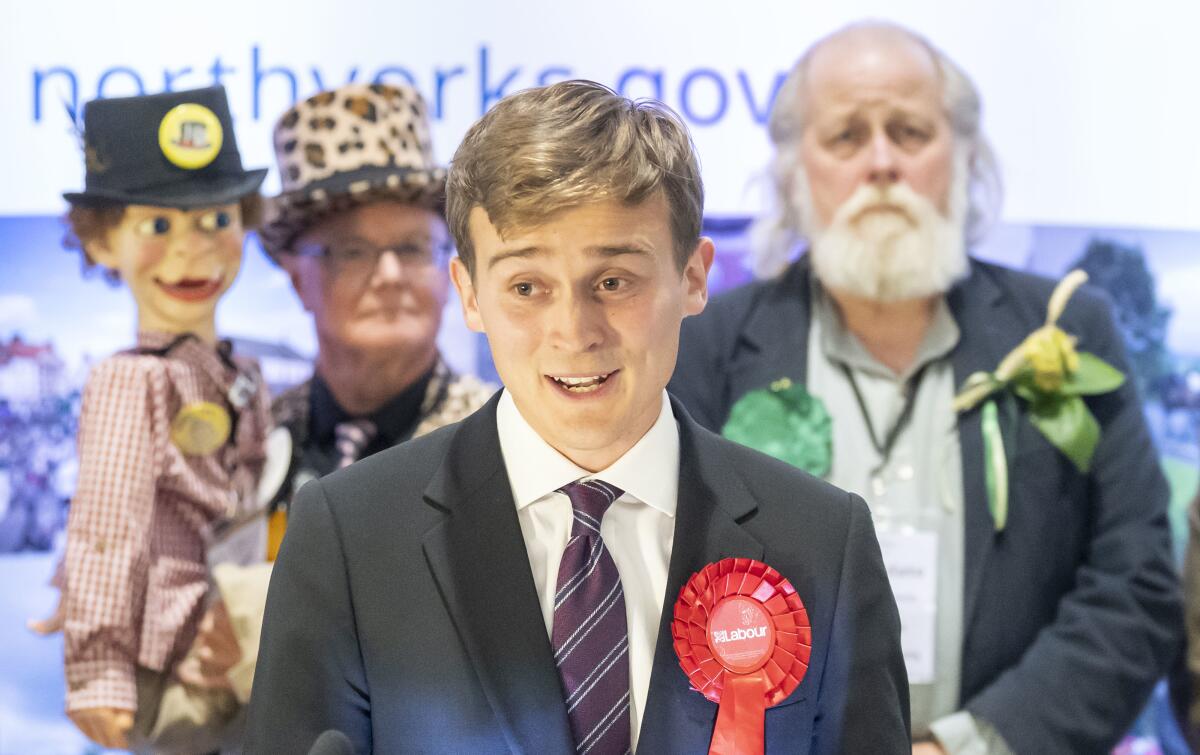
- Share via
LONDON — Voters weary of economic pain and political turmoil handed Britain’s governing Conservatives two thumping defeats Friday in a trio of special elections that point toward likely defeat for the party in the next national election.
The Conservatives avoided a complete wipeout by narrowly holding on to former Prime Minister Boris Johnson’s seat in suburban London — a sliver of comfort for current Prime Minister Rishi Sunak.
Sunak said the results showed that the next general election, due by the end of 2024, was not “a done deal.”
But elections expert John Curtice said the Conservatives were “in a deep electoral hole” after the main opposition Labor Party and the smaller centrist Liberal Democrats overturned huge Conservative majorities to win a seat apiece.
The three results show the Conservatives losing ground with a broad range of voters: suburban Londoners, small-town dwellers in the north of England and rural residents in the southwest. If replicated in a general election, the results would see Labor emerge as the biggest single party, possibly with an overall majority.
“We hear that cry for change away from the chaos, away from those rising bills, the crumbling public services — a cry for change, and we will deliver,” Labor leader Keir Starmer said alongside the party’s 25-year-old winning candidate, Keir Mather, in the northern seat of Selby and Ainsty. “The first time we’ve won here is the first time we’ve overturned a 20,000 majority, the biggest majority we’ve ever turned over in the history of the Labor Party.”
The number of people moving to Britain reached a record high in 2022, renewing debate about the scale of immigration and its impact on the country.
The Liberal Democrats took the rural seat of Somerton and Frome in southwest England with a similarly large swing away from the Conservatives.
“The people of Somerton and Frome have spoken for the rest of the country who are fed up with Rishi Sunak’s out-of-touch Conservative government,” said Liberal Democrat leader Ed Davey. He congratulated candidate Sarah Dyke beside a confetti-firing mock circus cannon emblazoned with the line “Get these clowns out of No. 10,” the prime minister’s Downing Street residence in London.
The Conservatives won Uxbridge and South Ruislip in West London by 495 votes — down from a majority of 7,000 under Johnson — after a campaign that focused on an unpopular local green levy imposed by London’s Labor mayor.
Sunak headed straight off to the scene of his party’s sole electoral success and noted that governments often find midterm elections difficult.
President Biden and British Prime Minister Rishi Sunak are reiterating their commitment to help Ukraine repel Russia’s ongoing invasion.
“The message I take away is that we’ve got to double down, stick to our plan and deliver for people,” he said during a visit to a cafe in the district.
The defeats don’t mean a change of government, since the Conservatives still have a sizable majority in the House of Commons. But they confirm the trend of opinion polls, which for months have given Labor a double-digit lead — sometimes up to 20 percentage points — nationwide over the Conservatives, who have been in power since 2010.
The two defeats also showed voters making tactical choices, backing the party most likely to defeat the Conservative candidate. That will leave many Conservative lawmakers rattled ahead of a national vote.
“It’s tempting, obviously, for Conservative spin doctors to emphasize Uxbridge and the result that they got there,” said Tim Bale, professor of politics at Queen Mary University of London. “But I think really they will be deluding themselves if they think that that bodes well for the next general election.”
Britain and the European Union finally reach a post-Brexit agreement that will allow goods to flow freely to Northern Ireland from the rest of the U.K.
The Conservatives, also known as the Tories, have been plagued by the fallout from the tumultuous terms of Johnson and his successor as prime minister, Liz Truss, who quit within weeks after her plan for unfunded tax cuts alarmed financial markets, worsening a cost-of-living crisis and sending mortgage costs soaring.
Johnson triggered one of the special elections when he quit as a lawmaker last month, almost a year after resigning as prime minister, when a standards watchdog concluded he’d lied to Parliament about lawbreaking parties in his office during the pandemic. The former lawmaker in Selby and Ainsty, an ally of Johnson’s, followed him out the door while the member of Parliament in Somerton and Frome resigned amid sex and drugs allegations.
The bruising defeats make it likely that Sunak will shake up his government with a Cabinet shuffle when Parliament returns from its summer recess in September. Under Britain’s electoral system, Sunak can call a national election whenever he feels the time is right, though it must be within five years of the last one, which was held in December 2019.
There are also questions for Starmer, who has been cautious in laying out his plans for government, to the frustration of some party supporters.
Commentary: Pledge allegiance to Britain’s King Charles? I’ll pass on that part of the coronation
Charles’ coronation continues a historic ritual that dates back more than 1,000. It’s captivating to watch, but a little cringey too.
Labor’s failure to win Uxbridge and South Ruislip will likely stoke some concern over London Mayor Sadiq Khan’s plan to expand an anti-pollution zone — first introduced when Johnson was mayor — to outer boroughs of London, which slaps a daily emissions charge on older gas and diesel vehicles.
Starmer acknowledged that the levy was the reason Labor lost in Uxbridge and South Ruislip. He said that “the mayor needs to reflect. And it’s too early to say what should happen next.”
Bale said Labor “will worry a little bit, since much of the party’s economic message is built around green issues.”
But he said the Conservatives should be more concerned, because many voters who backed them during the 2019 general election had become disillusioned.
“We got used to the idea that somehow there was this big realignment in British politics and the Conservatives were capable of winning seats where they weren’t before,” he said. “I think the Conservatives now should be quite worried ”
More to Read
Sign up for Essential California
The most important California stories and recommendations in your inbox every morning.
You may occasionally receive promotional content from the Los Angeles Times.
